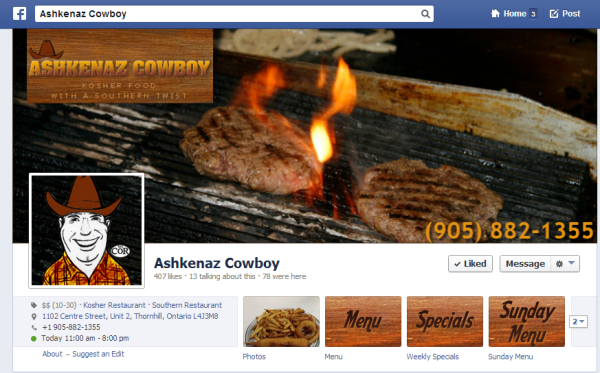You Don’t Have To Be Big To Do Social Right!
One of the biggest misconceptions when it comes to social marketing is that it’s only for big brands with big budgets. This fallacy has to come to an end now. Some of the best examples of effective social media marketing that I’ve ever seen come from small businesses. A classic example is the Ashkenaz Cowboy […]
One of the biggest misconceptions when it comes to social marketing is that it’s only for big brands with big budgets.
This fallacy has to come to an end now. Some of the best examples of effective social media marketing that I’ve ever seen come from small businesses. A classic example is the Ashkenaz Cowboy restaurant.
The Ashkenaz Cowboy is local restaurant in my neighborhood. I first heard about it via the original social media — from a friend during a face-to-face conversation. Within a week, I visited the restaurant — and found that their use of social engagement was far beyond anything I’ve ever seen from any big brand.
First off, everyone working there is over-the-top friendly and makes you feel like you’ve been a long-time customer from the very first time you walk in the door. When they discovered that it was my first time there, they asked how I’d heard of them and if I’d be kind enough to like their Facebook Page. When I said yes, they handed me a simple black-and-white piece of paper with the URL to their Facebook page:

Contained in the simple wording of this slip of paper was the value statement of what I’ll get for liking them: “Updates & Specials.” It also served as a reminder to like their page as soon as I got home. It wasn’t crowded by other non-related information (e.g., the URL to their website) and merely had a caricature of the head chef and owner, Chuck.
On Facebook, the Ashekanz Cowboy doesn’t disappoint. At a minimum, they post a link to their specials each week. A quick scan of the specials frequently has me planning my weekly eating habits if one of my favorites is listed.
This past summer, they used Facebook to create excitement and engagement. Twice, they posted a teaser on Facebook saying if they received x likes within a few hours, they’d make the announcement that day. If not, it would be up in a few days. Of course, their loyal customers and Facebook fans quickly liked the post and, as promised, they made their announcement that day.
Additionally, they are very good with customer interaction on Facebook. If you leave a comment on their page, they’ll generally acknowledge it with a like (and frequently with a comment) within one day.
The staff at the restaurant doesn’t stop being social once you’ve liked their page. When purchasing one of their specials, they’ll often ask us to post what we thought of it on the Ashkenaz Cowboy Facebook page. This is a smart move — not only does this appear on their page (reminding fans to come out and try it), it also appears on that poster’s personal Facebook wall (thus extending their reach).
On one occasion, when I was there trying out a new special (I was the lucky first person to buy it), I was asked if I could take a photo of it and post it to their page. I did, of course, and even posted it to Instagram — all from my smartphone.
This small business (generally no more than 4 people working at any given time) decided to focus on the one social medium that most of their current and potential customers use: Facebook. While you can check into the Ashkenaz Cowboy on FourSquare and read reviews, they don’t have time for it, nor do most of their customers. So why get distracted by a social medium that your customers don’t use?
When I finally asked who in the restaurant is managing their Facebook page (as I wanted to tell them they were doing a great job), they said we’re too busy making people feel welcome in the restaurant — so they outsource it. They send their page manager the specials once a week and he posts them.
Some of their staff do monitor the Facebook page and interact appropriately as time permits. They know the importance of Facebook to their business and are now making plans to bring the daily Facebook tasks in-house.

The key lesson here is: if a small takeout place with 6 seats can rock Facebook and keep the social experience going even with a lineup out the door, then mid-size and large brands should be able to devote enough of budget and staff training to not only succeed at social marketing but knock the socks right off of it.
Contributing authors are invited to create content for MarTech and are chosen for their expertise and contribution to the search community. Our contributors work under the oversight of the editorial staff and contributions are checked for quality and relevance to our readers. MarTech is owned by Semrush. Contributor was not asked to make any direct or indirect mentions of Semrush. The opinions they express are their own.
Related stories